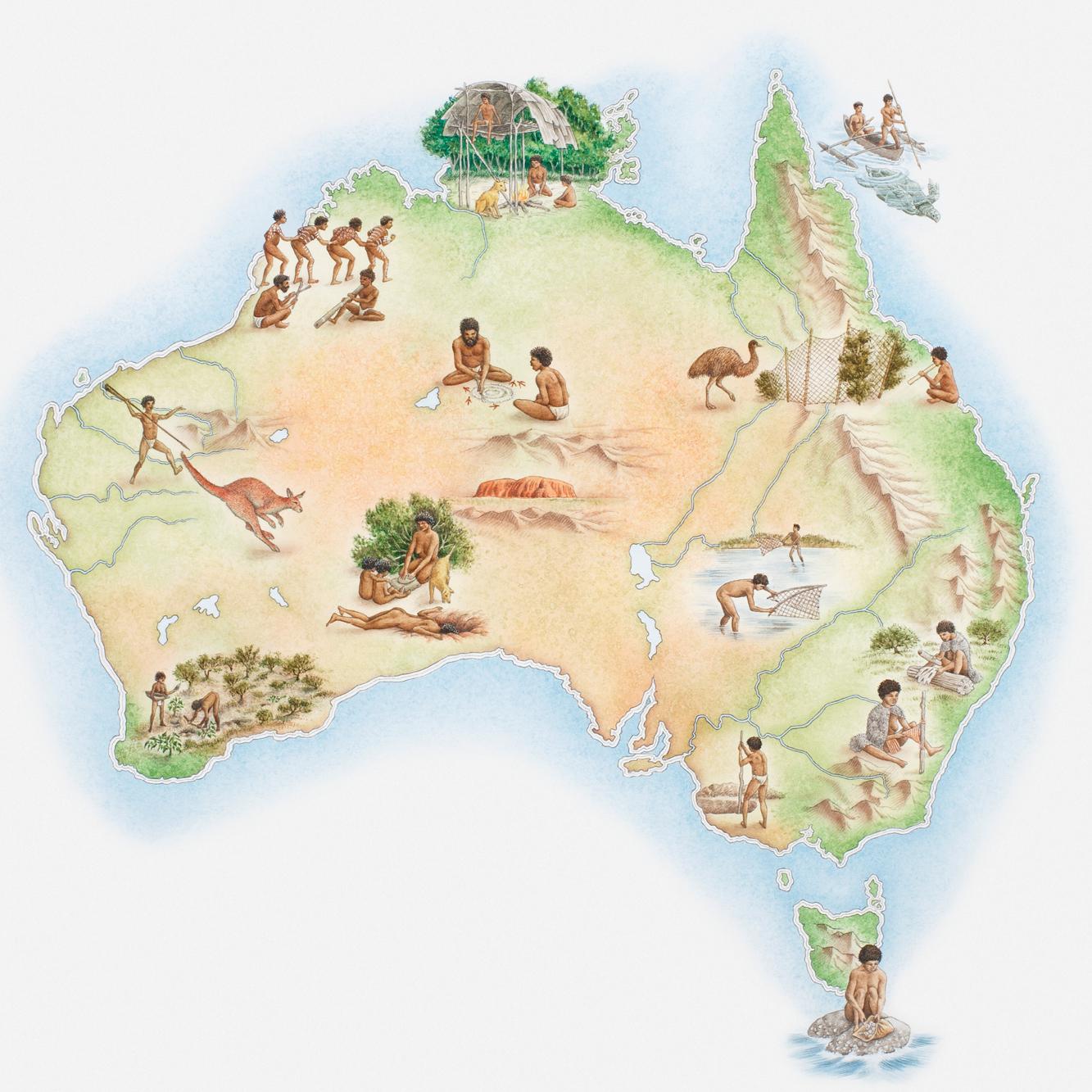We travel around the world to experience rich history and culture, whilst we still can’t grasp onto the shame of our past, and neglect to embrace that we are among the wealthiest right here in Australia.
The oldest living culture in the world, the First Nations of Australia, called this continent home for over 60,000 years, with more than 500 tribes and 250 languages, distinct cultural practices, and a profound physical and spiritual connection to land and sea.
They lived in harmony with autonomy of their own customs, traditions and laws.
“From what I have said of the Natives of New Holland they may appear to some to be the most wretched people upon earth, but in reality they are far more happier than we Europeans; being wholy unacquainted not only with the superfluous but the necessary conveniencies so much sought after in Europe, they are happy in not knowing the use of them. They live in a Tranquillity which is not disturb’d by the Inequality of the Condition. The earth and Sea of their own accord furnishes them with all things necessary for Life.”
– Captain Cook August diary entry 1770
The history of Australia Day
The becoming of 26 January has an unsettling history and each year the voices to change the date only grows louder. There is continually a strong divide and opposing opinions on the news, social media and at dinner conversations.
To some, 26 January is a modern tradition worth defending, and to others, it signifies the beginning of deep loss – loss of sovereignty, rights to their land, loss of their family and the right to practise their culture. A devastating impact of colonisation that is still affecting our First Nations peoples and communities.
It is reported that only 38% of Australians could correctly identify the historical event that happened on 26 January.1 Australia’s national day has not always been celebrated on 26 January. It was first celebrated on 30 July in 1915 to raise funds for World War I and then changed again the following year in 1916 to July 28.
Initially, 26 January was celebrated in New South Wales, known variously as ‘Anniversary Day’, ‘First Landing Day’ or ‘Foundation Day’, which marks the anniversary of the arrival of the First Fleet of ships at Port Jackson and the raising of the flag of Great Britain at Sydney Cove in 1788.
It wasn’t until 1946 that all Australian states and territories used the name ‘Australia Day’ to mark 26 January and, in 1994, 26 January was officially recognised as a public holiday.
In reality, no other country in the world celebrates a day of unification based on the date of colonisation. In most other nations, their national holiday marks independence or foundation. For example, New Zealand celebrates ‘Waitangi Day’ as its national day, signifying the signing of the Treaty of Waitangi in 1840 and what’s considered New Zealand’s founding document, a day which signifies unity.2
Moreover, Australia is the only Commonwealth national government that has not signed a treaty with its First Nations peoples.
Celebrating unification on the day that marks dispossession of our First Nations peoples indicates that the European invasion is the primary source of identity and pride.3
Historically dissenting voices of celebrating 26 January
The celebration of colonisation has been protested and opposed many years before 26 January was officially recognised as a national public holiday only 28 years ago in 1994.
In 1888, the New South Wales Premier at the time, Henry Parkes, was asked which activities would be included for Aboriginal people in the celebrations marking a centenary of British colonisation of Australia, to which he responded: “And remind them that we have robbed them?”
The ‘Aborigines Progressive Association’ (APA), founded in 1937 by William Ferguson and Jack Patten, campaigned for Indigenous land rights, citizenship and genuine autonomy for First Nations peoples.
On 26 January 1938, while many Australians celebrated the 150th anniversary of colonisation, the APA organised a conference with around 100 First Nations people in attendance at Australia Hall in Sydney called ‘A Day of Mourning and Protest’.4
The APA endorsed a long-range policy for First Nations peoples addressed to Joseph Lyons, the Prime Minister of Australia. The long-range policy included 10 points which called for new policy changes requesting citizen rights, land rights, education and abolishment of the Aboriginal Protection Board.5
“On this day the white people are rejoicing, but we, as Aborigines, have no reason to rejoice on Australia’s 150th birthday. Our purpose in meeting today is to bring home to the white people of Australia the frightful conditions in which the native Aborigines of this continent live,” Mr Patten said.6
Although the gathering held on 26 January 1938 brought about little change at the time, the Day of Mourning and Protest became the driving force for the movement to change the date and recognise the sorrow faced by First Nations peoples every year on 26 January.
Consequently, on 26 January 1988, over 40,000 people gathered in the largest march ever held in Sydney to protest the celebration of the bicentenary celebration of colonisation. It aimed to educate the nation about the poor conditions of First Nations health, education and welfare, and the high imprisonment rates and deaths in custody suffered by Aboriginal people.7
Advocating vs Activism
The individuals supporting and advocating for First Nations social and political issues are frequently labelled in the media as activists or agitators.
History illustrates that collective action is required to make significant changes in society and participation of a broad range of citizens is seen as a public good. However, negative stereotypes about personal characteristics of activists are often associated with being militant, aggressive and hostile. and repels individuals from associating once the issue is labelled as activism.
Although the term ‘activism’ carries significant meanings and has led to many necessary changes in society, these negative stereotypes can affect opinions and delegitimise the movement and message being conveyed. Thus, despite recognising the need for change, many individuals avoid supporting social change in the form of activism due to the negative connotations attached to the term.
Therefore, labelling an individual or group supporting a movement for change as an activist, inevitably discredits their message and many people will disassociate. Using the term activist can illustrate bias against a particular individual or point of view.8
While there is a place for activism in society, it is important to normalise supporting or advocating for necessary change without being labelled as an activist.
Reflection on Change the Date
Numerous organisations have acknowledged that 26 January is not a day of celebration, but a day of mourning. Corporations such as Telstra, Spotify, and Channel 10 announced that they were offering staff the option of working on 26 January and substituting the public holiday for another day.
Channel 10 has taken a firm stance, announcing that 26 January will no longer be referred to as ‘Australia Day’ at the company.9 The email read “For our First Nations people, we as an organisation acknowledge that January 26 is not a day of celebration. We recognise that there has been a turbulent history, particularly around that date and the recognition of that date being Australia Day.”
The University of Wollongong (UOW) has become the latest employer to give staff the option to work on Australia Day and substitute the public holiday on another day in solidarity with First Nations peoples.10
“Every year ‘Australia Day’ is celebrated on the 26th is another year I feel robbed of joining celebrations. I want to celebrate all of the great things about our country like everyone else but how can I do that when it always has and always will be a day of pain and mourning?” said Levi Power of Yorta Yorta Country.11
Are we culturally competent?
Part of being culturally competent is about putting yourself in someone else’s shoes and seeing the world through their eyes, and a commitment to ongoing learning, reflection and inclusive practices.
The uncomfortable reality of Australia’s history is exposed on 26 January, and in turn, the truth is diminished and oppressed. 26 January should be used as a mirror for national reflection, as opposed to a national celebration. It serves as a powerful opportunity to promote truth-telling, healing and reconciliation – and this is what makes us culturally competent as a nation.
What alternative day represents unification as a nation?
There is no debate that we should celebrate this beautiful country together as a nation with parades, BBQs and fireworks. However, a more inclusive and appropriate date could be established that sees a celebration for all Australians and not division. Here are some of the alternative dates that symbolise unification for Australia:
May 27
On May 27, 1967, Australia held a referendum to include First Nations in the census count. This day marks unification for Australia as a nation and is also marks the beginning of National Reconciliation Week each year.
June 3
On June 3, 1992, the Mabo case, led by Eddie Koiki Mabo, overturned the legal concept of ‘terra nullius’ – that land claimed pre-colonisation belonged to no one. This decision recognised native title and unified the nation by recognising the inadequacies of our national foundations.
What can we do instead of celebrating on 26 January?
Whilst living amongst two realities with the divide, there are other ways to show solidarity with First Nations’ peoples on this day of mourning. We genuinely live amongst the oldest living culture in the world and every day is an opportunity to learn, reflect, listen and support.
Here are some ways you can support our First Nations peoples:
- Attend a local event to support the community
- Learn and reflect about the history and culture of First Nations peoples
- Connect with First Nations elders and communities and listen to their stories
- Diarise and celebrate key cultural dates – see the QLS Cultural Calendar 2023
- Participate in QLS Lawlink – contact cos@qls.com.au for more information
- Learn the traditional owners on whose land you are on – click here
- Continue the conversation.
Understanding the history of 26 January is important for all Australians as we come together and look to a new date that is inclusive and a true celebration for all.
Heather Ferris is the First Nations Legal Coordinator at Queensland Law Society.
Footnotes
1 culturalinfusion.org.au/australia-day.
2 coact.org.au/seeing-australia-day-through-indigenous-eyes.
3 reconciliation.org.au/the-annual-australia-day-debate-kicks-off-early.
4 aiatsis.gov.au/explore/day-of-mourning.
5 Ibid.
6 Ibid.
7 deadlystory.com/page/culture/history/The_1988_Bicentenary_Protest.
8 poynter.org/newsletters/2018/when-activist-is-used-as-a-weapon.
9 news.com.au/entertainment/tv/current-affairs/channel-10-takes-firm-stance-in-ongoing-australia-day-debate/news-story/e129fc0bb7fc299504240953a0485d06.
10 abc.net.au/news/2023-01-09/university-of-wollongong-gives-staff-option-work-australia-day/101837094.
11 firstpeoplesvic.org/news/lets-hear-what-mob-have-to-say-about-january-26.














2 Responses
If the QLS is going to insist on publishing opinion pieces in favour of one side of a contentious political issue (this article, and the case for ‘The Voice’ being recent examples), then it should also publish the contrary view as well. Is this not what we do as lawyers? Take sides and debate?
The whole “change the date” push is the usual symbolism over substance. Every year we have this needless hand-wringing on what is supposed to be a day of celebration, for all Australians. Heaven forbid we might enjoy a single day of patriotism without the usual suspects (sections of media and professional activists) finding something to whinge about on behalf of others.
I say let’s enjoy the day, and stop inventing problems where there aren’t any.
P.s. Where were the opinion pieces when it mattered? Y’know, the Covid-mania everyone seems to have forgotten about? When the government was decreeing with gleeful contempt that our liberties didn’t matter: compulsory dodgy vaccines (or lose your job), citizen tracking, forced businesses closures, arbitrary restrictions on freedom of movement, people turned away from critical medical treatment, segregation from society based on medical status. Those are some real issues to write about. But not a peep from the QLS or any of its opinion writers.
Shouldn’t this be on the ABC’s website? Why are my membership fees paying for this far left political nonsense?
It used to be only the legal services commission was staffed with people that had such little consideration for the profession.